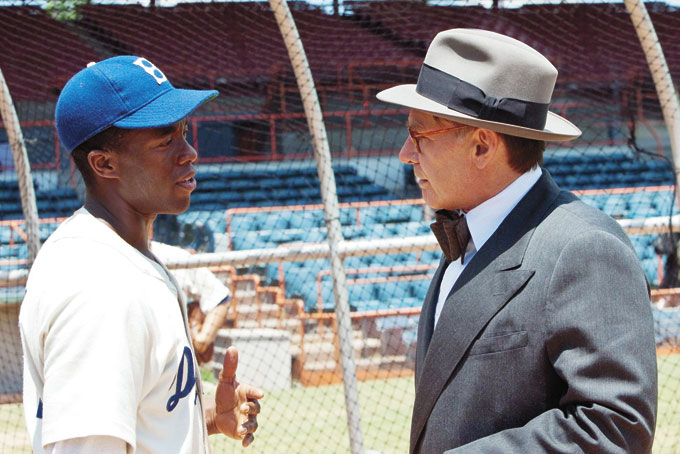
JACKIE ROBINSON (Chadwick Boseman) AND BRANCH RICKEY (Harrison Ford) talk at Spring Training.
The movie “42” is not just another sports movie, and it’s not just another bio, or civil rights movie. It’s all three wrapped around a beautiful love story.
“42” tells the story of two men—the great Jackie Robinson and legendary Brooklyn Dodgers General Manager Branch Rickey—whose brave stand against prejudice forever changed the world by changing the game of baseball.
The movie focuses on just two years of Jackie Robinson’s illustrious career. His first two years in the Brooklyn Dodgers organization. The first year was his first and only year on the Dodgers minor league team in Montreal, and the second was his pioneering rookie season with the Brooklyn Dodgers.
For those of you who have been lost on an island of self, or simply have never read a history of Black people at all, Jackie Robinson was the man who broke the color line in Major League Baseball which also opened the doors for Blacks in other professional sports such as the NBA and the NFL.
The general manager of the Dodgers, Branch Rickey, played by Harrison Ford, decided it was time for baseball to open its doors to Blacks and turn its back on racism in 1945 but the key was to find the right Negro who could not only play at a high level but would be able to absorb the abuse without exploding and fighting back. He had to be young enough to have a future, but old enough to have the right maturity needed. Robinson was 28 when he entered the Majors. And even though it doesn’t come out and say it in the movie Rickey worked closely with the Pittsburgh Courier and other Black newspapers in finding that Negro. That’s why Courier sports writer Wendell Smith played a prominent part in the movie.
Smith, played by Andre Holland, not only tells the story, but was the man Rickey used to take Robinson, played by Chadwick Boseman, around from place to place because he could not room with the White players. He was also a mentor to Robinson in helping him understand the importance of what he was doing.
The movie dealt with this relationship beautifully as the two men became close friends as Smith went on to break the color barrier for Black reporters in the press box at Major League Baseball games. But during Robinson’s first year he had to sit in the stands with his typewriter on his knees.
Harrison Ford did an excellent job as Rickey. A very powerful man who knew what he wanted and didn’t allow anyone to stop him from what he believed was right and moral, making him more money, as well as helping the Dodgers win the World Series, which they did in Robinson’s rookie season.
Unlike many sports movies it showed the tough men’s stuff between the players but was also a soft tender movie capturing the love of Jackie and Rachael Robinson which really made it special compared to the womanizing athletes of today. No matter what happened to Jackie, no matter what he had to go through, Rae as he called her, played by Nicole Behaire, was always there being the rock on which he stood. The love between the two was so strong and solid that nothing was going to stop him. She felt just as strong as he did about racism not just in baseball or professional sports but in the country as a whole.
There may be many who feel the movie did not do enough to tell the story of segregated sports, or enough about Jackie Robinson. For example his exploits at UCLA in which he probably was the greatest overall athlete to ever play there, starring in baseball, football, basketball and track. About his being an officer in the military but was court martialed because he was talking to a light skin woman who the bus driver thought was White, and refused to move to the back of the bus. He won the case but left the military after the war.
The movie didn’t deal with the crusade the Courier and other Black newspapers led to get Blacks into the Major Leagues. Nor did it deal with Robinson’s long career which not only landed him in the Hall of Fame but lists him as probably the greatest second baseman of all times. There was none better.
But instead it dealt with the two critical years in which the most important accomplishment in this country in civil and human rights since the Emancipation Proclamation. This not only opened the doors to Blacks in professional sports, it gave fuel to the fire for equal rights in education and employment at every level. Robinson had proven that Blacks not only had the physical abilities but the same mental capacity as Whites.
Robinson died in 1972, ten days after his last appearance in which he stressed the need for more Black coaches and managers in professional sports.
The Pittsburgh Public Schools, private schools, and charter schools should all plan a field trip of their students to see this movie. The movie was just over two hours so it couldn’t deal with everything.
Two other movies, if you can find them at the library, that deals in more details are “The Court Martial of Jackie Robinson” starring Andre Braugher, and “The Jackie Robinson Story” starring Jackie Robinson himself.
Brian Helgeland wrote and directed the film. Robinson broke the color barrier on April 15, 1947 when he played his first game for the Brooklyn Dodgers, now the Los Angeles Dodgers. All Major League teams will honor Jackie Robinson this season at different times. The Pirates celebrated Robinson on Monday, April 14.
Rachel Robinson put her stamp of approval to the movie stating that it has been long overdue.